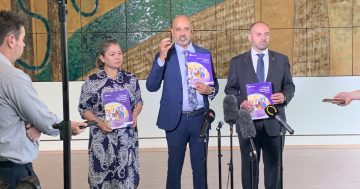
National Race Discrimination Commissioner Giridharan Sivaraman has called on governments to do more to tackle racism. Photo: Supplied.
Government departments across all jurisdictions are struggling with racism and do little to coordinate efforts with each other to address the issue, according to a new report from the Australian Human Rights Commission (AHRC).
The terminology used to describe and counter racism is working against, the study has found, and positive work being done is failing to enter public awareness in any meaningful way.
The report, titled `Mapping government anti-racism programs and policies’, has found federal, state and territory departments are failing to adequately identify and address racism.
In some cases, the very term “racism” is being consciously avoided, according to the report.
Where there are initiatives in place, these approaches are often ad-hoc, disjointed and reactive.
Coordination between governments, agencies and sectors is also found to be lacking.
The report outlines “negatively racialised communities” are too often forced to compete with one another for funding to support affected communities and there is little focus on addressing racism against First Nations communities.
It also identifies a lack of political bipartisanship as an obstacle to action.
“Overall, there is a reluctance on the part of the government to use the term ‘racism’,” the report states.
“Government preference over the past decade for use of ‘social cohesion’ has weakened approaches to anti-racism work.”
National Race Discrimination Commissioner Giridharan Sivaraman said the report showed governments at all levels in Australia were not taking seriously enough their responsibility for action to address racism.
“If some areas of government are reluctant to use the term ‘racism’, how can they tackle it?,” the commissioner said.
“Australia needs a national plan to address racism, and this plan needs to be a whole-of-society approach, which coordinates efforts at all levels of government and across all sectors.
“It needs to set benchmarks and measure outcomes, and, importantly, it needs to centre those impacted by racism.”
The Federal Government is supporting the AHRC with $7.5 million over four years to develop a National Anti-Racism Strategy in consultation with First Nations communities and others negatively racialised.
The commissioner described the report as a significant milestone on the road to later this year launching a national anti-racism framework – a “call to action for all levels of government” and organisations across all sectors.
The report recommends the establishment of a national anti-racism council; the development of a nationally recognised definition of racism; a clear, whole-of-government strategic approach to addressing racism; formal monitoring of progress; better addressing of racism in schools; and a national database of anti-racism policies, programs and outcomes.
“Many people in Australia do not experience the dignity, respect and opportunity they deserve, particularly First Nations peoples,” the commissioner said.
“Racism impacts opportunities and outcomes in all areas of people’s lives. Recent ruptures in our society have seen dramatic rises in racism towards First Nations peoples, antisemitism, anti-Asian racism, anti-Arab racism and Islamophobia.
“This shows systemic failures to deal with racism.
“Australia has national plans to tackle problems like mental health, child abuse, and domestic violence. Our current ad-hoc approach towards racism is not good enough.”
PwC Indigenous Consulting and the Jumbunna Institute for Indigenous Education and Research at UTS produced the report for the commission.
Research for the report focussed on publicly available information from federal, state and local government as well as the community sector.
Information included legislation, strategies, plans and frameworks, reconciliation action plans, resource materials, campaigns, research, reviews and evaluations, position statements and grant funding programs.
Interviews about relevant policy and programs were also conducted with stakeholders across all levels of government, relevant community organisations, First Nations groups and academic research specialists.
As reported in Region this week, the Australian Public Service has made inroads in its workforce into advancing First Nations people.
The APS Reform Agenda includes the SES100 recruitment initiative to increase the representation of First Nations Senior Executive Service (SES) leaders in the APS from 54 to 100 by mid-2025. The latest update shows representation has grown to 68.
The reform is also committed to growing First Nations employment across the APS to five per cent by 2030 while new programs are being designed and implemented to address barriers to First Nations recruitment, retention and advancement within the APS.
Talent development pipelines to better support emerging First Nations talent at the EL2 and SES Band 1 levels are also being designed.
Original Article published by Chris Johnson on Riotact.








